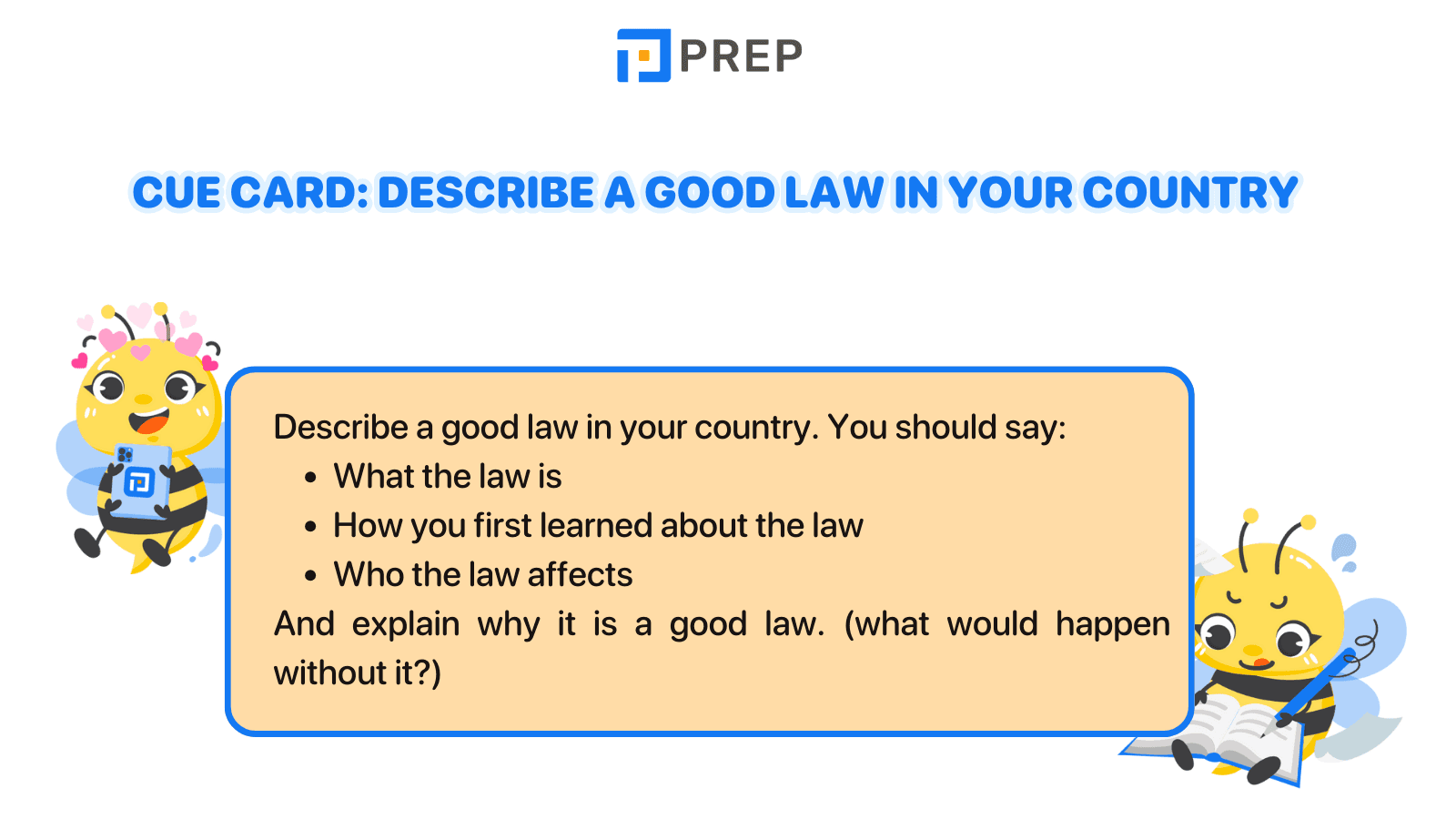Sample Speaking Part 2, 3: Describe a good law in your country
In recent years, the task of "Describe a good law in your country" has appeared quite frequently in real-life test questions. This can be considered a relatively difficult topic because Vietnam has many laws, and not everyone is fully familiar with them. Therefore, the teachers at PREP have prepared an outline, ideas, take-notes in 1 minute, and a detailed sample response for the topic "Describe a good law in your country".
Refer to the article below to effectively prepare at home and achieve a high band score in the real-life test!

I. IELTS Speaking Part 2 question and answer: Describe a good law in your country
1. Cue card: Describe a good law in your country
Describe a good law in your country. You should say:
-
What the law is
-
How you first learned about the law
-
Who the law affects
And explain why it is a good law. (what would happen without it?)

2. Outline: Part 2
2.1. Sample idea
-
The task "Describe a good law in your country" requires test-takers to describe a law in their country, providing the following information:
-
What is the law?
-
How did you learn about this law?
-
Who does this law affect?
-
Explain why this is a useful law (what would happen if it didn't exist)
-
-
The "Describe a good law in your country" task belongs to the "Others" topic category - topics that do not fall under the major popular topic groups. Similar to other questions in this category, you should closely follow the questions in the cue card, as this group of topics usually does not have a common essay structure.
-
Question 1: What is the law? You need to be able to state the name of the law, provide details on what the law entails, and the penalties for violating the law.
-
Question 2: How did you learn about this law? This is the background information, not the main focus of the speech, but there are various aspects you can explore: why the law was enacted, what event or situation led to its creation, and through what media or means you were informed about this law, or who told you about it. Pay special attention to the verb tenses in this part, as you will be discussing past events, so the past tense should be used.
-
Question 3: Who does this law affect? What segments of society has this law impacted? Workers? Businesses? The elderly? The youth? Think about the different spheres of social life and assess the impact on specific target groups.
-
Question 4: Explain why this is a useful law:
-
This is where you will analyze the positive impact of this law on different groups. How has people's lives changed because of this law? Has it formed any new habits? What issues have been improved since the law was enacted?
-
You can imagine how this law has impacted your own life, and then generalize that into the overall positive effects it has had, as part of your "Describe a good law in your country" response.
-
2.2. One-minute note taking
|
What the law is |
|
|
How you first learned about the law |
|
|
Who the law affects |
|
|
Why it is a good law |
|
3. IELTS Speaking Task 2 samples: Describe a good law in your country
Referring to the sample IELTS Speaking Part 2 answer on the topic "Describe a good law in your country" can help you effectively practice for the IELTS Speaking Part 2 exam at home and achieve a very high band score in the actual test!

Let's take a look at the IELTS Part 2 Speaking examples podcast - "Describe a good law in your country":
I've never thought much about this, so I don't have a lot of choices, but there's one law that has been having significant impacts on my daily life, that is the law which makes wearing a face mask compulsory in public places during the coronavirus pandemic. Those who don't comply with the law will have to pay a fine of around 1 to 3 million VND.
Starting in late 2019, the pandemic has exerted a heavy toll on most countries around the world, and in order to protect its citizens' health, the Vietnamese government brought forth a law which requires all members of the public to have their face mask on when they leave their house. The government took full advantage of the media and the press to make sure that every single citizen was well informed of the law, for their own protection and others'. I remember reading about it in a well-known online newspaper, and then it was all over social media. I also believe that it is crucial for everyone to be aware of their responsibility in order to halt the spread of the virus.
This law applies to all inhabitants in Vietnam, no exception, which means that it doesn't matter for what reason you go out, be it work, study or personal business, you have to wear a face mask. The compliance rate was actually much higher than a lot of people initially expected. Many were pessimistic that it seemed impossible to force every single person to wear a mask when they went out, but the majority of Vietnamese people are very concerned about their own health and that of their family, so they follow the law very strictly even to this day.
Thanks to this law, Vietnam has successfully controlled the pandemic, allowing economic and social activities to return to normal, well, sort of, but this is the best we can have, given the nightmare we’ve been living in for the past 2.5 years. Without it, the contraction rate and the death rate would have been much higher, and our life would still be put under a lot of restrictions. I think I'll keep wearing a face mask even after the pandemic has ended, as it is a good habit and it helps prevent dust while traveling as well.
Vocabulary that can help you score well in the IELTS Speaking Part 2 sample essay on the topic "Describe a good law in your country":
-
compulsory (adj): mandatory, obligatory
-
pandemic (n): global health crisis
-
comply (with) (v): adhere to, follow
-
exert a heavy toll (on) (phrase): have a significant impact on
-
bring forth (phrase): introduce, implement
-
take full advantage of (phrase): maximize the use/benefits of
-
(be) informed of (phrase): be provided information about
-
aware (of) (a): cognizant, knowing
-
halt (v): stop, prevent
-
compliance rate (phrase): rate of adherence
-
pessimistic (a): negative, gloomy
-
contraction rate (phrase): infection rate
-
(be) put under restrictions (phrase): have restrictions imposed
Note: You can use this sample essay as a response for similar IELTS Speaking Part 2 topics, such as: Describe a law in your country, Describe an important law in your country, Describe a law which you think is good, Talk about a good law in your country,...
II. Sample IELTS Speaking Part 3: Law
Let's listen to the IELTS Speaking Part 3 sample podcast - Laws:
1. Is there any situation where people disobey the law?
There are a few situations that I can think of. For example, some people might exceed the speed limit because they have to hurry home and take care of a sick family member, or they may be late for work. Some steal from others because they are in a very difficult financial situation and they have no way to make money.
I don't think it's the right thing to do but sometimes the circumstances of the violators need to be taken into consideration to understand their motivation while committing a crime. There are, of course, those who violate the law as a force of habit or they find it inconvenient to follow the rules, and I believe they should be strictly punished.
-
circumstance (n): a situation or condition
-
violator (n): a person who violates or breaks a law or rule
-
violate (v): to fail to respect or abide by, to break
2. Why do some people want to become a lawyer?
First of all, it is a very well respected profession. Lawyers are often looked up to, because they tend to be law-abiding citizens who are very well educated, well behaved and knowledgeable.
What is more, lawyers are also paid handsomely, which I believe to be deserving because they have to study intensively, do a lot of research and undergo a significant amount of training to get to where they are.
-
well respected (a): highly regarded, esteemed
-
law-abiding citizen (phrase): a person who obeys the law
-
knowledgeable (a): well-informed, having a lot of knowledge
-
(be) paid handsomely (phrase): be paid very well, generously compensated
-
deserving (a): worthy, meriting
-
intensively (adv): with a high degree of effort or concentration
3. Do you think that people in your country obey the law all the time?
I would say that generally, Vietnamese people abide by the law strictly, but I don't think people in any country would comply with the law all the time. There are always criminals everywhere we go, for all sorts of reasons, and that’s a fact of life that we have to accept.
Some people may inadvertently break the law while others do it on purpose. Whatever the reason is, I don't believe that it’s the right thing to do.
-
abide (by) (v): to comply with, adhere to
-
inadvertently (adv): unintentionally, by accident
-
on purpose (adv): intentionally, deliberately
III. Conclusion
This article has provided the most comprehensive sample IELTS Speaking Part 2 + 3 essay on the topic "Describe a good law in your country", compiled by the teachers at PREP. Refer to this to effectively practice at home, solidify your understanding of how to properly structure and deliver a speaking response to achieve a very high band score in the actual IELTS Speaking exam.

Hi I'm Chloe, and I am currently serving as an Product Content Administrator at Prep Education. With over five years of experience in independent online IELTS study and exam preparation, I am confident in my ability to support learners in achieving their highest possible scores.
Comment
Premium content
View allPersonalized roadmap
Most read












